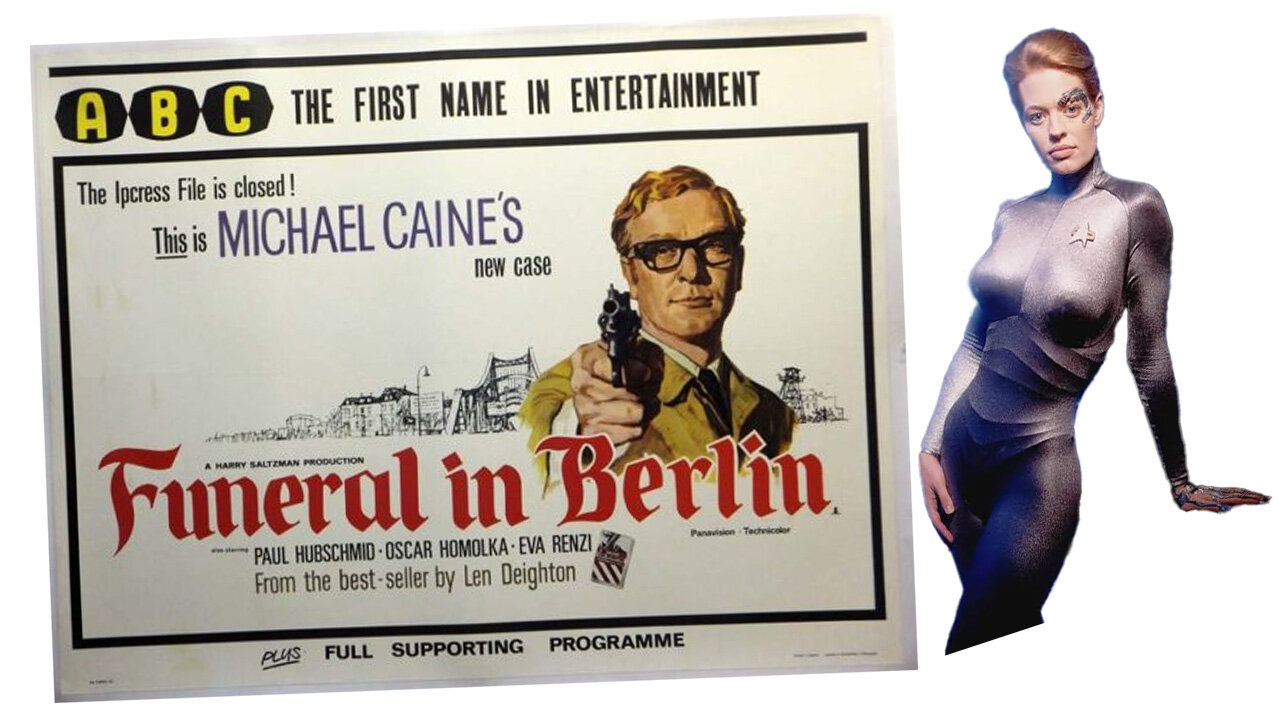Premium Only Content

'Funeral in Berlin' (1966) Movie of the Book by Len Deighton
Directed by Guy Hamilton; Based on the novel by Len Deighton
'Funeral in Berlin' (1966), the second film to star Michael Caine as the unnamed British spy later christened “Harry Palmer,” is a sharp, stylish, and distinctly sardonic Cold War thriller. Adapted from Len Deighton’s 1964 novel of the same name, the film serves as a middle entry in the original Palmer trilogy ('The Ipcress File', 'Funeral in Berlin', and 'Billion Dollar Brain') and continues the deliberate subversion of the glamorous spy genre typified by James Bond. Directed by Guy Hamilton—best known for his work on several Bond films—'Funeral in Berlin' stands as a taut, character-driven story that favors wit, moral ambiguity, and espionage procedure over gadgetry and gunplay.
Set almost entirely in the divided city of Berlin, the film captures the Cold War at its most atmospheric. The Berlin Wall, Checkpoint Charlie, shadowy alleys, and grey government buildings serve not only as a backdrop but as essential characters in a story built on secrecy, surveillance, and deception. In contrast to the exotic escapades of Bond, 'Funeral in Berlin' roots itself in the bureaucratic and psychological reality of espionage. It presents a world where treachery is transactional and truth is layered in duplicity.
Michael Caine reprises his role from The Ipcress File with characteristic cool and dry sarcasm. His Harry Palmer is no action hero—he is bespectacled, working-class, and professionally disinterested in patriotic rhetoric. He is competent but disillusioned, more likely to be found filling out forms or sarcastically insulting his superiors than seducing women or performing daring stunts. This persona makes Palmer an ideal vehicle for Deighton’s original vision: espionage as bureaucratic drudgery punctuated by moments of sudden, brutal risk.
The plot centers on a supposed defection scheme orchestrated by Palmer’s intelligence service. A Soviet colonel named Stok, played with measured charisma by Oskar Homolka, offers to defect to the West. Palmer is assigned to handle the operation, which involves elaborate subterfuge—including forged documents, a fake funeral, and a coffin meant to carry the colonel across the Berlin Wall. Yet, as the plan unfolds, Palmer uncovers layers of double-crosses, with motives and loyalties shifting from scene to scene. A beautiful but mysterious woman, Samantha Steel (Eva Renzi), complicates the mission further, serving both as a romantic interest and a cipher of Cold War manipulation.
One of the film’s most admirable qualities is its restraint. Hamilton directs with a tight, efficient style, avoiding action-movie spectacle in favor of slow-burn tension and uneasy silences. The cinematography by Otto Heller uses naturalistic lighting and real Berlin locations to lend a documentary-like realism, enhancing the mood of paranoia. The score by Konrad Elfers is understated, reflecting the film’s overall tone: measured, ironic, and wary of melodrama.
Where the film particularly excels is in its moral complexity. Palmer is no idealist, and the intelligence services on both sides of the Iron Curtain are portrayed as deeply cynical institutions. The British, Americans, Soviets, and Israelis all appear to be manipulating events to their own ends, often at the expense of truth or human life. The character of Stok is particularly compelling—not a villain, but a weary veteran of political gamesmanship, fully aware of the absurd theater he inhabits.
That said, the film is not entirely without flaws. The pacing in the second act can lag, particularly as the convoluted plot unfolds through hushed conversations and cryptic meetings. Some supporting characters, including the Israeli agent and Palmer’s MI5 boss, lack the depth of their literary counterparts. Moreover, the film’s emotional core is intentionally muted; it favors intellectual engagement over visceral connection, which may leave some viewers feeling detached from the stakes.
Nevertheless, 'Funeral in Berlin' succeeds as an intelligent, atmospheric thriller that offers a stark counterpoint to the era’s dominant spy fantasy. Where James Bond saves the world, Harry Palmer merely survives it. He doesn’t destroy secret lairs or outwit megalomaniacs—he dodges paperwork, bureaucratic indifference, and quiet betrayals.
In conclusion, 'Funeral in Berlin' remains a standout entry in the Cold War spy film canon. It is a moody, cleverly crafted portrait of espionage as a moral grey zone, where enemies and allies look alike and death comes wrapped in official protocol. With Michael Caine’s quietly defiant performance at its center, the film holds up not just as an adaptation of Deighton’s novel but as a valuable artifact of 1960s political cinema—reserved, skeptical, and all too aware that in the shadow world of spies, even a funeral may be a lie.
-
 LIVE
LIVE
FreshandFit
2 hours agoAfter Hours w/ Girls
11,814 watching -
 LIVE
LIVE
Inverted World Live
3 hours agoJoe Exotic Calls From Prison | Ep. 118
4,105 watching -
 56:24
56:24
DeVory Darkins
11 hours ago $0.94 earnedFederal Judge issues shocking order against Trump as Chicago Mayor pulls insane stunt
96.3K243 -
 LIVE
LIVE
Badlands Media
9 hours agoBaseless Conspiracies Ep. 153
5,344 watching -
 23:51
23:51
Stephen Gardner
2 hours ago🚨Trump did the UNTHINKABLE!
16.5K41 -
 2:54:14
2:54:14
Barry Cunningham
5 hours agoBREAKING NEWS: PRESIDENT TRUMP SAYS HE MAY INVOKE THE INSURRECTION ACT! AND NOW WE KNOW WHY!
25.6K14 -
 40:13
40:13
Clownfish TV
11 hours agoMagic the Gathering Champion BANNED from Tournament Over MAGA Hat?! | Clownfish TV
9.36K19 -
 2:49:47
2:49:47
TimcastIRL
4 hours agoTrump Considers Invoking INSURRECTION ACT To Deploy National Guard to Portland | Timcast IRL
157K80 -
 10:05:38
10:05:38
Dr Disrespect
12 hours ago🔴LIVE - DR DISRESPECT - BLACK OPS 7 - GIVE ME BACK MY NUKE
130K16 -
 LIVE
LIVE
Drew Hernandez
2 hours agoTARGETED LEFTIST TERRORIST ATTACK IN CHICAGO & ISRAEL GEOFENCING U.S. MEGA CHURCHES
945 watching
